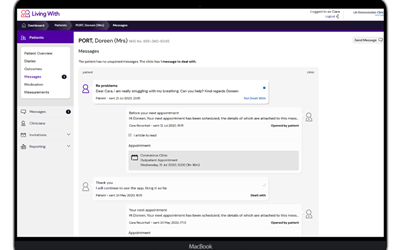New research, published in BMJ Open and funded by the National Institute for Health and Care Research (NIHR), examines the impact of long Covid on the lives of over 3,750 patients who were referred to a long Covid clinic and used a digital app as part of their NHS treatment for the condition.
The Digitally-enabled rehabilitation for people with Long Covid (Living With Covid Recovery), supported by NIHR ARC North Thames, uses questionnaires on an app to collect patients’ experiences about how long Covid is affecting their ability to carry out day-to-day activities, levels of fatigue, depression, anxiety, breathlessness, brain fog, and their quality of life.
Fatigue is the symptom that most significantly impacts the daily lives of long Covid patients, and can affect quality of life more than some cancers, a new study led by researchers at UCL and the University of Exeter has found.
The researchers found that many long Covid patients were seriously ill and on average had fatigue scores worse or similar to people with cancer-related anaemia or severe kidney disease. Their health-related quality of life scores were also lower than those of people with advanced metastatic cancers, like stage IV lung cancer.
Overall, the team found that the impact of long Covid on the daily activities of patients was worse than that of stroke patients and was comparable to that of patients with Parkinson’s Disease.
Dr Henry Goodfellow, who co-led the study alongside the late Professor Elizabeth Murray (both UCL Institute of Epidemiology & Health and supported by ARC North Thames), said: “Up to 17% of people who get Covid go on to develop long Covid*. However, the impact of the condition on patients’ day-to-day lives isn’t fully understood.
“Our results have found that long Covid can have a devastating effect on the lives of patients – with fatigue having the biggest impact on everything from social activities to work, chores and maintaining close relationships.”
This suggests that long Covid not only negatively impact the lives of patients on an individual level, but it could have a significant economic and social impact on the country. In order to be referred to a long Covid clinic, a patient must have had symptoms in keeping with long Covid for at least 12 weeks after an acute infection. Findings suggests:
- Over 90% of long Covid patients using the app were of working age (18-65);
- 51% said they had been unable to work for at least one day in the previous month, with 20% unable to work at all;
- 71% of patients were female.
As working-age women make up a majority of the health and social care workforce, the impact of long Covid on their ability to function may add additional pressures to already stretched services. Dr Goodfellow said: “We hope that a greater understanding of the symptoms and impact of long Covid in these patients will help the NHS and policymakers to target limited resources by adapting existing services and designing new ones to better meet the needs of patients with long Covid.”
The research was carried out alongside partners at Southampton University, University of Exeter, Barts Health NHS Trust, University College London Hospitals NHS Trust, Royal Free Hospital, and Living With Ltd. The research is funded by the National Institute for Health and Care Research (NIHR) and supported by NIHR ARC North Thames.
Click here to view the original press release on the UCL News website.

 08 Jun 2023
08 Jun 2023
